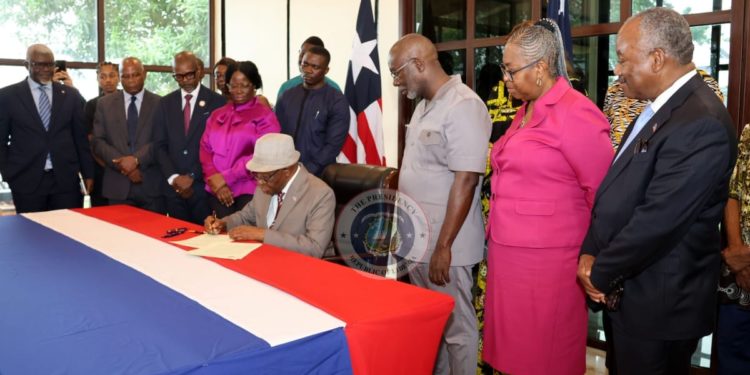By Kemo Cham
Liberian President Joseph Boakai on Thursday, May 2nd signed an Executive Order to establish a War and Economics Crimes Court, paving way for the trial of people suspected of committing the greatest crimes during the country’s 14 years civil war which ended over 20 years ago.
Liberia went through two separate civil wars, starting in 1989 and ending in 2003.
The conflict was characterised by widespread atrocities, including massacres, rape, and the use of child soldiers.
About 250,000 people were killed between the two wars, according to reports.
The Liberian civil war is widely believed to have spilled over to Sierra Leone, which also experienced a brutal eleven years’ unrest from 1991 to 2002.
But unlike its neighbour, Sierra Leone prosecuted people deemed as bearing the greatest responsibility for the atrocities during its war, among them former Liberian President Charles Taylor, who is serving a 50 year jail term in Rwanda for his role in fueling the Sierra Leonean war.
A Truth and Reconciliation Commission hearing in Liberia also recommended for the establishment of a special court to try those bearing the greatest responsibilities for the crimes. But both former presidents Ellen Johnson Sirleaf and George Weah dragged their feet on efforts towards that.
President Boakai, who assumed office in January after his election victory late last year, had promised to create the court to ensure long overdue justice for victims of the war.

The President said at the signing ceremony at the Executive Mansion in Monrovia on Thursday that the move not only signifies his administration’s commitment to justice and rule of law, but that it also serves as affirmation that impunity will not be allowed to prevail under his watch.
“For peace and harmony to have a chance to prevail, justice and healing must perfect the groundwork,” he said at the event attended by human rights campaigners and foreign diplomats.
Thursday’s event followed the approval of the legal instruments by lawmakers of both the lower house of representatives and Senate.
President Boakai hailed the lawmakers for their support for the law.
“The direct representatives of the people spoke through their collective and overwhelming vote as they passed the resolution. And so, we must act, and act now,” he said.
The development has received commendations from both within and outside Liberia. Human rights groups which have been calling for justice since the end of the war have hailed it. Adama Kiatamba Dempster, National Secretary General of the National Civil Society Human Rights Advocacy Platform of Liberia, said it is a major step towards ending the culture of impunity in Liberia.
The United States Chargé d’affaires, Catherine Rodriguez, recommitted the US’s support for a “historic and courageous” step to bring justice and accountability for the atrocities committed during the war.
Praises for the move also came from representatives of the European Union and the Economic Community of West African States in the country.
The court is expected to operate in line with international standards, with support from international institutions like the United Nations.
But not every Liberian is in support of the idea of creating a war crimes court. And those opposed to it say it could jeopardize the country’s fledgling peace.
One prominent critic of the idea has been former warlord and now politician, Senator Prince Johnson, well known for the brutal murder of former Liberian president Samuel Doe in the early days of the war.
Johnson who has also transformed himself into a religious preacher, has vigorously used his influence as a politician to frustrate efforts to create the court.
The current Vice President of the country is his ally, thanks to a coalition he formed with Boakai’s Unity Party ahead of last year’s elections.
Johnson is reported to have signed the resolution of senators approving the creation of the war crimes courts.






















